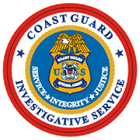
The Federal Bureau of Investigation (FBI) is the domestic intelligence and security service of the United States and its principal federal law enforcement agency. An agency of the United States Department of Justice, the FBI is a member of the U.S. Intelligence Community and reports to both the Attorney General and the Director of National Intelligence. A leading U.S. counterterrorism, counterintelligence, and criminal investigative organization, the FBI has jurisdiction over violations of more than 200 categories of federal crimes.

Counterintelligence (counter-intelligence) or counterespionage (counter-espionage) is any activity aimed at protecting an agency's intelligence program from an opposition's intelligence service. It includes gathering information and conducting activities to prevent espionage, sabotage, assassinations or other intelligence activities conducted by, for, or on behalf of foreign powers, organizations or persons.
In the United States, a special agent is an official title used to refer to certain investigators or detectives of federal, military, tribal, or state agencies who primarily serve in criminal investigatory positions. Additionally, some special agents operate in criminal intelligence, counterterrorism, or counterintelligence-based roles as well, with one or all of these roles occasionally taking precedence over criminal investigatory tasks.

The United States Naval Criminal Investigative Service (NCIS) is the primary investigative law enforcement agency of the U.S. Department of the Navy. Its primary function is to investigate major criminal activities involving the Navy and Marine Corps, though its broad mandate includes national security, counterintelligence, counterterrorism, cyberwarfare, and the protection of U.S. naval assets worldwide. NCIS is the successor organization to the former Naval Investigative Service (NIS), which was established by the Office of Naval Intelligence after the Second World War.

The Bureau of Diplomatic Security, commonly known as Diplomatic Security (DS), is the security branch of the United States Department of State. It conducts international investigations, threat analysis, cyber security, counterterrorism, and protection of people, property, and information. Its mission is to provide a safe and secure environment for officials to execute the foreign policy of the United States.
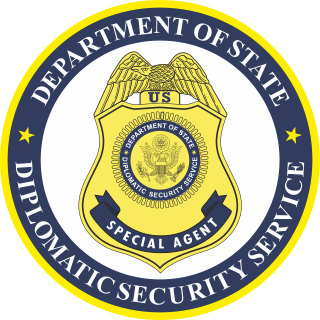
The Diplomatic Security Service (DSS) is the principal law enforcement and security agency of the United States Department of State (DOS). As the operational division of DOS Bureau of Diplomatic Security, its primary mission is to provide security to protect diplomatic assets, personnel, and information, and combat transnational crimes connected to visa and passport fraud. DSS also conducts counterterrorism, counterintelligence, cybersecurity and criminal investigations domestically and abroad.

The Air Force Office of Special Investigations is a U.S. federal law enforcement agency that reports directly to the Secretary of the Air Force. OSI is also a U.S. Air Force field operating agency under the administrative guidance and oversight of the Inspector General of the Department of the Air Force. By federal statute, OSI provides independent criminal investigative, counterintelligence and protective service operations worldwide and outside of the traditional military chain of command. Proactively, OSI identifies, investigates, and neutralizes serious criminal, terrorist, and espionage threats to personnel and resources of the Air Force, Space Force, and the U.S. Department of Defense, thereby protecting the national security of the United States.
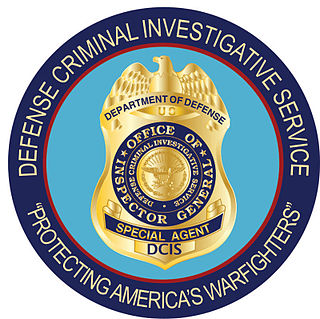
The Defense Criminal Investigative Service (DCIS) is the criminal investigative arm of the U.S. Department of Defense Office of Inspector General. DCIS protects military personnel by investigating cases of fraud, bribery, and corruption; preventing the illegal transfer of sensitive defense technologies to proscribed nations and criminal elements; investigating companies that use defective, substandard, or counterfeit parts in weapon systems and equipment utilized by the military; and stopping cyber crimes and computer intrusions.
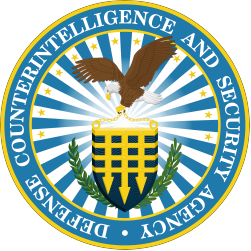
The Defense Counterintelligence and Security Agency (DCSA) is a federal security and defense agency of the United States Department of Defense (DoD) that reports to the Under Secretary of Defense for Intelligence. DCSA is the largest counterintelligence and security agency in the federal government and is responsible for providing personnel vetting, critical technology protection, counterintelligence, training, education and certification. DCSA services over 100 federal entities, oversees 10,000 cleared companies, and conducts approximately 2 million background investigations each year.

Coast Guard Intelligence (CGI) is the military intelligence branch of the United States Coast Guard, and a component of the Central Security Service of the United States Department of Defense.

The United States Department of the Army Criminal Investigation Division (CID), previously known as the United States Army Criminal Investigation Command (USACIDC) is the primary federal law enforcement agency of the United States Department of the Army. Its primary function is to investigate felony crimes and serious violations of military law and the United States Code within the US Army. The division is an independent federal law enforcement agency with investigative autonomy; CID special agents, both military and civilian, report through the CID chain of command to the CID Director, who reports directly to the Under Secretary of the Army and the Secretary of the Army. Unlike their counterparts at OSI and NCIS, Army CID does not have primary counterintelligence responsibilities.
The counter-terrorism page primarily deals with special police or military organizations that carry out arrest or direct combat with terrorists. This page deals with the other aspects of counter-terrorism:
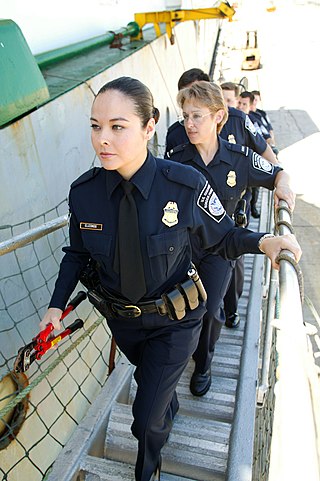
The federal government of the United States empowers a wide range of federal law enforcement agencies to maintain law and public order related to matters affecting the country as a whole.

United States Department of Defense Police are the uniformed civilian security police officers of the United States Department of Defense (DoD), various branches of the United States Armed Forces, or DoD agencies.
The United States Department of the Navy's Multiple Threat Alert Center (MTAC) provides indications and warning for a wide range of threats to Navy and Marine Corps personnel and assets around the world.
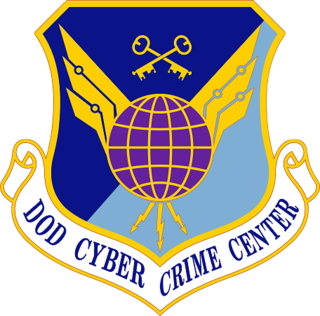
The Department of Defense Cyber Crime Center (DC3) is designated as a Federal Cyber Center by National Security Presidential Directive 54/Homeland Security Presidential Directive 23, as a Department of Defense (DoD) Center Of Excellence for Digital and Multimedia (D/MM) forensics by DoD Directive 5505.13E, and serves as the operational focal point for the Defense Industrial Base (DIB) Cybersecurity program. DC3 operates as a Field Operating Agency (FOA) under the Inspector General of the Department of the Air Force.

The United States Marine Corps Criminal Investigation Division is a federal law enforcement agency that investigates crimes against people and property within the United States Marine Corps.

United States Army Counterintelligence (ACI) is the component of United States Army Military Intelligence which conducts counterintelligence activities to detect, identify, assess, counter, exploit and/or neutralize adversarial, foreign intelligence services, international terrorist organizations, and insider threats to the United States Army and U.S. Department of Defense (DoD).

The United States Coast Guard Police (CGPD) are law enforcement units stationed at certain shore facilities of the United States Coast Guard.
The United States Department of the Navy Police is the uniformed security police program of the United States Navy. It provides professional, civilian, federal police officers to serve and protect U.S. Navy personnel, properties, and installations. DoN Police personnel represent the Department of the Navy's contribution to the Department of Defense Police program. DoN Police officers primarily work alongside U.S. Navy masters-at-arms, the military police of the U.S. Navy. Although under the Department of the Navy, the United States Marine Corps (USMC) maintains its own civilian law enforcement program for Marine Corps-centric installations, the USMC Civilian Police. Despite both employing civilian special agents, neither the Naval Criminal Investigative Service nor the USMC Criminal Investigation Division fall-under the auspices of the DoN/DoD Police; both agencies have their own chains of command.
